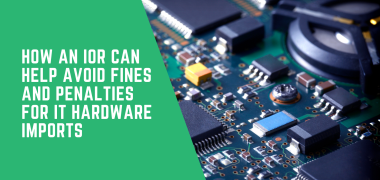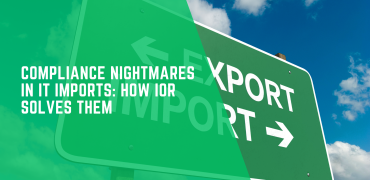In the fast-paced world of IT hardware, global supply chains are critical for meeting the demand for high-tech equipment. However, importing IT hardware into foreign markets comes with its own set of legal, logistical, and financial challenges. One key player in simplifying this process and ensuring compliance is the Importer of Record (IOR). This blog explores how an IOR can help businesses avoid fines and penalties when importing IT hardware.
Understanding the Role of an Importer of Record (IOR)
An Importer of Record is an individual or entity legally responsible for ensuring that goods comply with local customs regulations and laws. The IOR handles essential duties such as documentation, taxes, and customs clearance. For businesses importing IT hardware, partnering with an experienced IOR can streamline the process and mitigate risks.
Key Responsibilities of an IOR
- Customs Compliance:
- Ensuring all necessary permits and licenses are obtained.
- Adhering to import regulations, including country-specific restrictions on certain IT hardware.
- Tax and Duty Payments:
- Calculating and paying import duties, taxes, and fees.
- Taking advantage of applicable tax exemptions or reductions.
- Documentation Management:
- Preparing and submitting accurate customs declarations.
- Maintaining records for audits and inspections.
- Product Classification:
- Assigning the correct Harmonized System (HS) codes to products to ensure accurate duty assessments.
Common Challenges in Importing IT Hardware
Regulatory Complexity
Importing IT hardware involves navigating a maze of regulations that vary by country. Non-compliance can result in delays, fines, or even confiscation of goods.
Licensing and Certifications
Many countries require specific certifications for IT equipment, such as electromagnetic compatibility (EMC) certifications or cybersecurity approvals.
Data Protection Laws
IT hardware, especially devices capable of storing or transmitting data, must comply with local data protection regulations. Non-compliance can lead to severe penalties.
High Duties and Taxes
IT hardware often incurs significant import duties and taxes, which can inflate costs if not managed properly.
How an IOR Can Mitigate Risks
Ensuring Regulatory Compliance
An IOR’s expertise in local laws and regulations minimizes the risk of non-compliance. By managing permits, certifications, and documentation, the IOR ensures that imports meet all legal requirements.
Avoiding Fines and Penalties
Incorrect documentation or failure to comply with customs requirements can result in hefty fines. An IOR’s meticulous approach to paperwork and compliance reduces the likelihood of errors.
Reducing Costs
By accurately classifying products and leveraging tax exemptions, an IOR can lower import duties and taxes, saving businesses money.
Streamlining Logistics
The IOR’s role extends to coordinating with freight forwarders and customs officials, ensuring smooth and timely delivery of goods.
The Importance of Accurate Documentation
Essential Documents for IT Hardware Imports
- Commercial Invoice: Details the transaction between the buyer and seller.
- Packing List: Provides information on the contents of the shipment.
- Import Licenses: Required for specific types of IT hardware.
- Certificates of Origin: Verify the country of manufacture.
- Technical Documentation: Necessary for compliance with safety and technical standards.
Consequences of Inaccurate Documentation
- Delays: Customs clearance may be delayed, impacting project timelines.
- Fines: Errors in documentation can lead to financial penalties.
- Confiscation: In extreme cases, non-compliance can result in goods being seized by customs authorities.
Choosing the Right IOR for IT Hardware Imports
Expertise in IT Hardware
Not all IORs have the specialized knowledge required for IT hardware. Choose a provider with experience in importing high-tech equipment and understanding industry-specific regulations.
Global Network
An IOR with a robust global network can handle imports into multiple countries seamlessly, ensuring consistency in compliance and efficiency.
Transparent Pricing
Work with an IOR that offers clear and transparent pricing structures, so you can budget effectively for imports.
Proven Track Record
Look for testimonials, case studies, and certifications to ensure that the IOR has a history of successful IT hardware imports.
Case Studies
Case Study 1: Avoiding Fines in Europe
A U.S.-based IT company faced challenges importing network equipment into the European Union due to strict EMC certification requirements. By partnering with an IOR experienced in European regulations, the company ensured compliance, avoiding fines and project delays.
Case Study 2: Reducing Costs in Asia
A multinational firm importing data storage devices into Asia leveraged an IOR to classify products accurately and apply for duty exemptions under free trade agreements, resulting in significant cost savings.
Benefits of Partnering with an IOR
- Regulatory Expertise: Reduces the risk of non-compliance.
- Cost Efficiency: Helps lower duties and taxes.
- Operational Efficiency: Ensures timely and hassle-free imports.
- Risk Mitigation: Protects against fines, penalties, and confiscation.
Conclusion
For businesses importing IT hardware, compliance with customs regulations is non-negotiable. An Importer of Record plays a critical role in navigating the complexities of international trade, ensuring that imports are compliant, cost-effective, and efficient. By partnering with the right IOR, businesses can focus on their core operations, confident that their imports are in safe hands. Avoiding fines and penalties is just the beginning—an experienced IOR can be a strategic partner in optimizing global supply chains.




